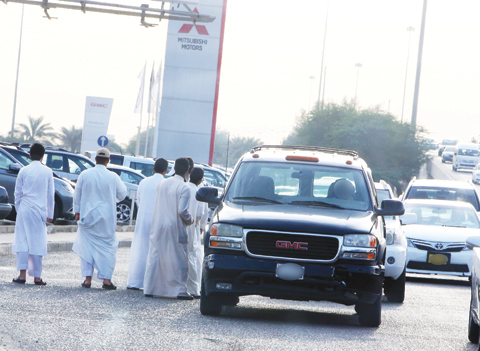"In the past, the work was easy and very convenient. Now people are hesitant to deal with us, although we buy their cars at a price that suits both of us."
Catching the attention of customers is tough in many businesses, but the work is even harder if one has to stand all day long streetside, waiting for prospective clients and forcing them to pay attention. This is the work of the "shretiyah" (one who bargains). These 'shretiyah' men wait at the entrance of car showrooms in Rai to give you a deal you can't refuse in exchange for your used car. Kuwait Times interviewed a shretiyah to learn more about the work of these bargainers.
Mubarak Al-Shammari, 36, said the work they do is hard, and that many customers do not like them. "We may seem annoying, but our work benefits everybody," he said. "The car showrooms in Rai are the best place where you can find people coming to buy new cars, and in return they want to sell their old cars. Here we offer them a price to buy their old car and it's their choice whether to sell or not. Moreover, any person coming to a car showroom to buy a new car will need cash quickly to pay the advance for the new car," he reasoned.
Whether you are an expatriate or a citizen, Shammari and his colleagues claim to complete the required paperwork at a good price. "Most companies will make you go through a lot of processes, but we get things done smoothly and quickly. After we buy the car, we fix it and put it up for auction at the 'haraj' used car market," he explained.
"In the past, the work was easy and very convenient. Now people are very hesitant about dealing with us, although we buy their cars at a price that suits both of us. The market was very good, but unfortunately today, technology has imposed itself on us. Most people turn to websites and search for cars that meet their specifications, value, color and everything else. The websites and apps have destroyed the auction market," Shammari rued. He said used car websites have proliferated among people of all ages and smartphones have made things easier, so people are reluctant to go to used car markets.
For Shammari, this work is not his dream job, but it is a means of living, something that he wishes people understand.
"There are many things that bother us, most notably security patrols and the police. They do not want us to stand here and offer to buy people's cars. But we do not force anyone to sell their cars. They want to control us and prevent us from doing our work - on the other hand, they cannot control traders on car websites, those who affix their cards on used cars for sale or traders who place ads with their phone numbers in newspapers and car magazines and write in bold 'We buy used cars'," Shammari argued.
By Faten Omar











